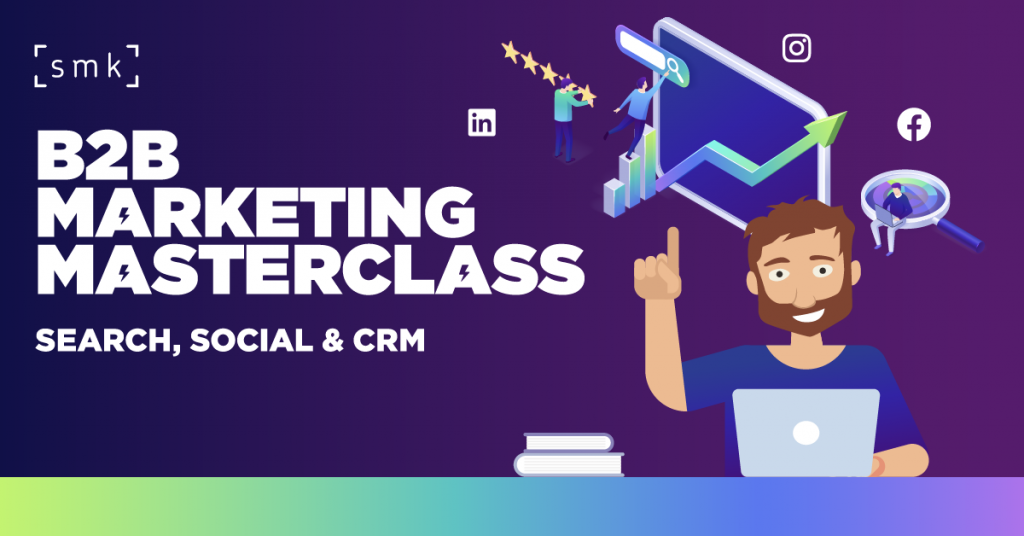Updated June 2025
Overview
Module 1: 2025 B2B Marketing Trends, Challenges & Opportunities
- Overview of B2B Marketing Landscape: Delve into the distinct characteristics of B2B marketing compared to B2C, highlighting the intricacies and nuances that define successful strategies in a business-to-business context.
- Role of Digital Channels in B2B Marketing: Examine how digital channels have become integral to B2B marketing strategies, from lead generation to customer retention, and discuss how these platforms facilitate deeper business relationships.
- Emerging Trends and Challenges for 2025: Explore the latest trends shaping the B2B marketing landscape in 2025, including technological advancements, evolving customer expectations, and the strategic responses to these challenges.
Module 2: Developing a B2B Marketing Strategy
- Key Components of a Successful B2B Marketing Strategy: Break down the essential elements that constitute a robust B2B marketing strategy, focusing on alignment with broader business objectives.
- Aligning Business Objectives with Marketing Goals: Learn how to sync marketing efforts with your company’s strategic goals to ensure both short-term gains and long-term success.
- Identifying and Understanding Your B2B Audience Personas: Craft detailed buyer personas by analysing your audience’s behaviour, needs, and decision-making processes, which is crucial for targeted marketing.
Module 3: Content Marketing for Business Audiences
- Crafting Valuable Content: Develop content strategies that directly address the pain points and needs of B2B buyers, enhancing engagement and trust.
- Engaging Content Across Formats: Master the art of creating and disseminating engaging, informative content through blogs, white papers, webinars, and case studies tailored to the preferences of a professional audience.
- Content Distribution and Promotion: Explore effective techniques for distributing and promoting content to maximise reach and impact, utilising both organic and paid channels.
Module 4: Search Engine Optimisation (SEO) for B2B
- SEO Fundamentals in a Business Context: Understand the foundational aspects of SEO tailored to the B2B sector, focusing on how SEO strategies differ from B2C.
- Keyword Research and Content Optimisation: Learn how to conduct effective keyword research tailored to B2B audiences and optimise your content for these keywords to improve search engine rankings.
- Technical SEO and Link-Building: Dive into technical SEO practices and link-building strategies that are particularly effective in B2B, enhancing UX, site authority and search visibility.
Module 5: Social Media Marketing in B2B
- Leveraging Social Platforms for Engagement: Explore how platforms like LinkedIn, YouTube, and Facebook can be used to foster B2B engagement and build professional networks.
- Brand Authority via Organic and Paid Activities: Discuss strategies to enhance your brand’s authority through a mix of organic content and targeted paid advertisements.
- Social Selling and Influencer Partnerships: Learn about the potential of social selling and creating influencer partnerships within B2B markets to expand reach and credibility.
Module 6: Email Marketing, CRM, and Automation
- B2B Email Campaign Best Practices: Examine the strategies behind successful B2B email campaigns, from planning to execution.
- Utilising Email Automation: Harness the power of email automation to nurture leads effectively and convert them into loyal customers.
- Designing Email Sequences: Create targeted email sequences that guide prospects through the sales funnel, enhancing conversion rates and customer engagement.
Module 7: Thought Leadership and Personal Branding in B2B Marketing
- Identifying and Cultivating Unique Insights: Focus on identifying unique insights and expertise that can set your brand apart in the industry.
- Engagement and Influencer Connections: Develop strategies for engaging with industry conversations and connecting with other thought leaders to enhance your brand’s visibility and authority.
- Utilising LinkedIn for Branding: Leverage LinkedIn for both personal and corporate branding, optimising profiles and content strategies to establish thought leadership and expand professional networks.
Module 8: Unlocking AI in B2B Marketing
- Scaling Content with Generative AI: Use AI tools to accelerate thought leadership, automate comms, and streamline content production without losing brand integrity.
- Smarter Segmentation and Targeting: Leverage AI for intent-based segmentation, predictive lead scoring, and dynamic audience modelling across CRM and ad platforms.
- AI for Sales Acceleration: Apply AI to surface high-intent prospects, optimise lead flow, and prioritise actions that drive pipeline velocity and revenue growth.
Course Content
Module 1: 2025 B2B Marketing Trends, Challenges & Opportunities
You don't currently have access to this content
Module 2: Developing a B2B Marketing Strategy
You don't currently have access to this content
Module 3: Content Marketing for Business Audiences
You don't currently have access to this content
Module 4: Search Engine Optimisation (SEO) for B2B
You don't currently have access to this content
Module 5: Social Media Marketing in B2B
You don't currently have access to this content
Module 6: Email Marketing, CRM, and Automation
You don't currently have access to this content
Module 7: Thought Leadership and Personal Branding in B2B Marketing
You don't currently have access to this content
Module 8: Unlocking AI in B2B Marketing
You don't currently have access to this content


